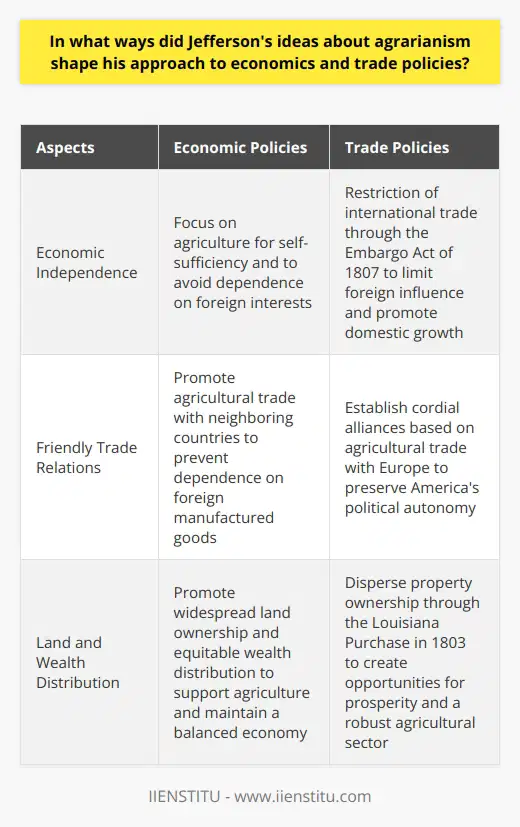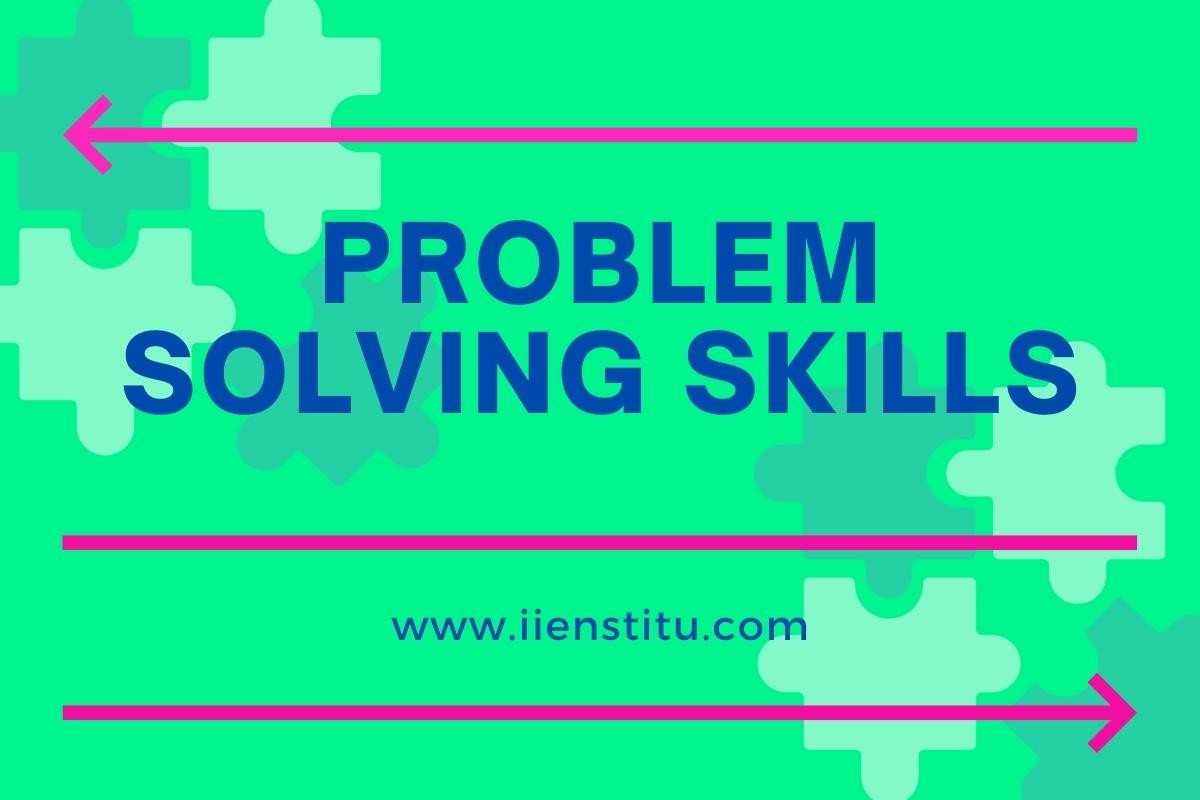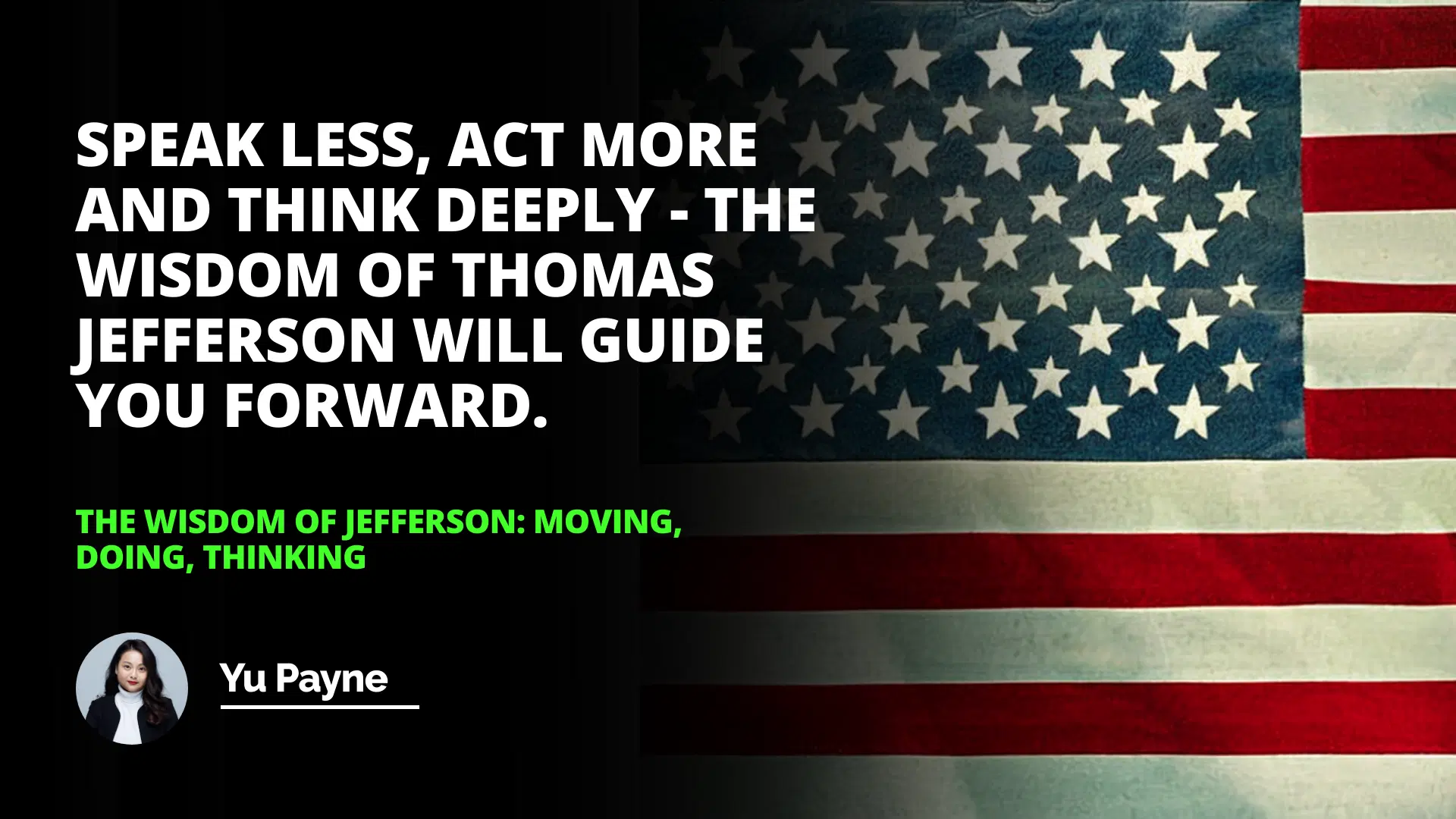
The journey of life is often filled with twists and turns, moments of triumph, and periods of challenge. Along this path, I've often sought guidance and words of wisdom to help navigate the complexities of daily existence. One figure whose insights have profoundly impacted me is Thomas Jefferson. His approach to living—rooted in movement, action, and deep contemplation—offers timeless lessons that resonate even in our modern world.
The Wisdom of Thomas Jefferson
Moving
Doing
Thinking
Embracing the Philosophy of Thomas Jefferson
Thomas Jefferson, a key architect of American independence and the third president of the United States, was more than just a political figure. He was a thinker, a doer, and someone who believed deeply in the power of the individual to effect change. His life exemplifies a balance between work and life, a harmony that many of us strive to achieve today.
Moving: The Power of Physical Activity
I remember a time when I felt utterly overwhelmed by the demands of work. The work-life balance at work seemed like an elusive dream. In search of relief, I turned to Jefferson's habits and discovered his dedication to physical movement. Jefferson once said, "Not less than two hours a day should be devoted to exercise, and the weather should be little regarded." Inspired by this, I began integrating daily walks into my routine.
Benefits I noticed:
Increased clarity of thought
Reduced stress levels
Improved overall health
Engaging in regular movement became a form of personal development, a way to not only care for my body but also to clear my mind. It reminded me that work and balance are achievable when we prioritize our well-being.
Doing: The Importance of Action
Jefferson was a man of action. He believed that making decisions and taking steps toward our goals are crucial. This idea pushed me to tackle challenges head-on, much like Jefferson did during his presidency when he orchestrated the Louisiana Purchase, effectively doubling the size of the United States.
Lessons from Jefferson's actions:
Seize opportunities when they arise
Don't fear failure; view it as a learning experience
Be proactive in solving problems
This proactive approach is essential in today's fast-paced world, where problem-solving skills are highly valued. By "doing," we transform our thoughts into reality, making tangible progress toward our aspirations.
Thinking: The Art of Reflection
While action is vital, Jefferson also placed immense value on contemplation. He was an avid reader and a philosopher at heart, understanding that deep thinking underpins meaningful action. I began setting aside time each day for reflection, which significantly enhanced my ability to make informed decisions.
Italicizing this practice, I've found, emphasizes its importance. Through reflection, we're able to:
Understand our motivations
Assess our strengths and weaknesses
Align our actions with our values
This balance of moving, doing, and thinking creates a holistic approach to life, one that fosters growth and fulfillment.
Applying Jefferson's Wisdom in Modern Life
In today's hyper-connected society, finding equilibrium can be challenging. We're constantly bombarded with information, and the line between work and personal life often blurs. Jefferson's wisdom provides a blueprint for navigating these waters.
Finding Work-Life Balance
The concept of work-life balance isn't new, but it's increasingly relevant. Jefferson's dedication to both his civic duties and personal interests exemplifies how we can harmonize our professional and personal lives.
Speak less, act more, and think deeply. The wisdom of Thomas Jefferson will guide you forward.
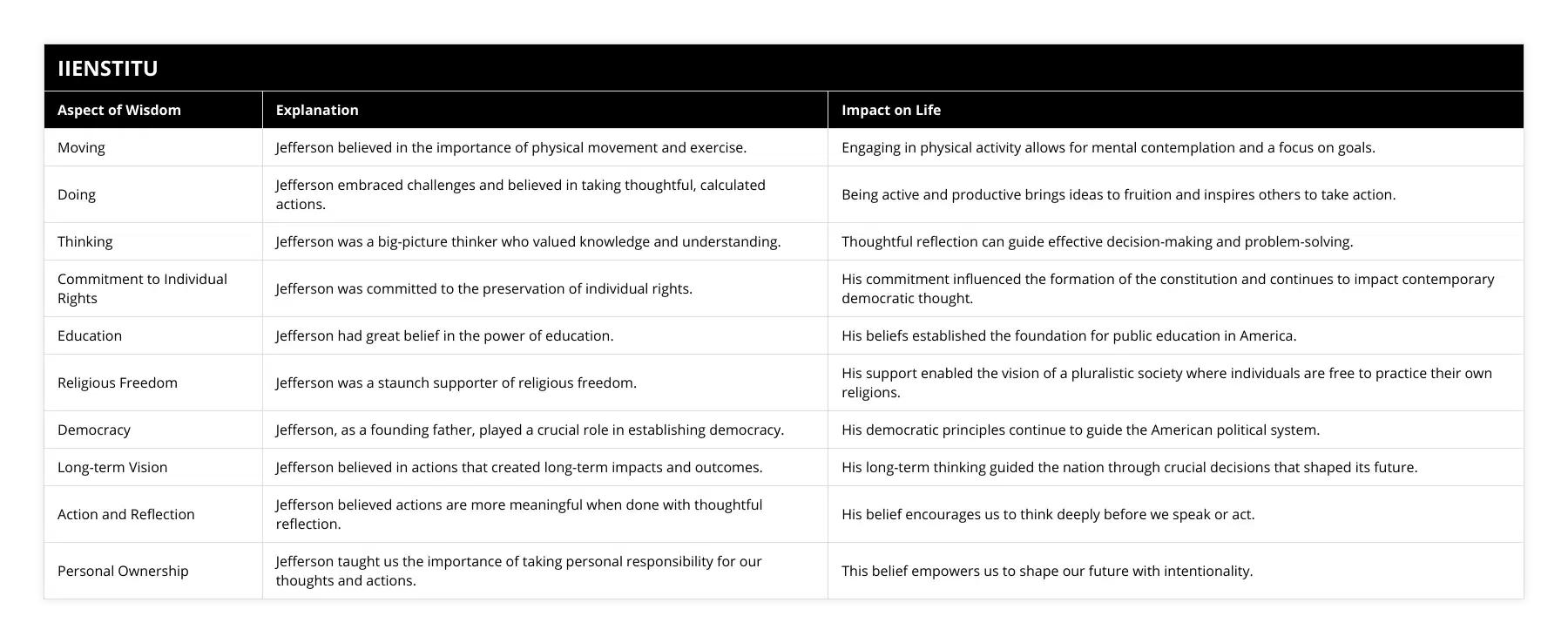
Strategies for balance:
Set clear boundaries between work and personal time
Engage in hobbies and interests outside of work
Prioritize relationships with family and friends
By adopting these practices, we not only enhance our quality of life but also become more productive and satisfied in our careers.
Decision Making and Personal Development
Jefferson's life teaches us the importance of thoughtful decision making. Whether it's a career change or a personal endeavor, applying deliberate thought can lead to better outcomes.
Steps for effective decisions:
Gather information
Weigh the pros and cons
Consider long-term impacts
This method mirrors modern life coaching techniques, which emphasize self-awareness and strategic planning. By investing in our personal development, we become better equipped to face life's challenges.
Words of Encouragement and Wisdom
Throughout his life, Jefferson offered many words of encouragement that continue to inspire. His belief in the potential of individuals to shape their destinies is a powerful reminder of our own agency.
"I like the dreams of the future better than the history of the past."
—Thomas Jefferson
These words of wisdom serve as a beacon, encouraging us to look forward with hope and determination.
The Intersection of Wisdom and Modern Challenges
One might wonder how Jefferson's 18th-century insights apply to contemporary issues like optimizing supply chain management or dealing with digital overload. The truth is, his principles are remarkably adaptable.
Optimizing Processes with Jeffersonian Principles
In business, concepts like optimizing supply chain management process tips are crucial for efficiency and success. Jefferson's methodical approach to organization and innovation can inform modern strategies.
Applying his principles:
Embrace continuous learning to stay ahead
Implement systematic processes for consistency
Encourage collaboration to enhance problem-solving
By looking to the past, we can find solutions that propel us into the future.
Conclusion: Living with Intentionality
Thomas Jefferson's legacy extends beyond his political achievements; it lies in the enduring wisdom he imparted. By incorporating his practices of moving, doing, and thinking, we can cultivate a life of purpose and fulfillment.
I've found that when I speak less, act more, and think deeply, I navigate life's complexities with greater ease. The journey toward balance and intentional living is ongoing, but with Jefferson's guidance, it feels attainable.
Let us carry forward his wisdom, embracing each day as an opportunity to grow, contribute, and find harmony between our work and life balance.
References
1- Ellis, J. J. American Sphinx: The Character of Thomas Jefferson. Vintage Books, 1998.
2- Bernstein, R. B. Thomas Jefferson. Oxford University Press, 2003.
3- Peterson, M. D. Thomas Jefferson and the New Nation: A Biography. Oxford University Press, 1970.
4- Peden, W. (Ed.). Notes on the State of Virginia. University of North Carolina Press, 1955.
5- Malone, D. Jefferson the President: First Term, 1801-1805. Little, Brown and Company, 1970.
Frequently Asked Questions
How does The Wisdom of Jefferson affect our modern day life?
Thomas Jefferson was an American statesman, diplomat, founding father of the United States, and the principal author of the Declaration of Independence. During his long and prolific career, Jefferson wrote volumes of material ranging from his political views to his observations of nature. From his writings, we can gain insight into his wisdom and philosophy and see how it has influenced and shaped our modern-day life.
Jefferson’s views on religious freedom and liberty are highly relevant to contemporary society. He believed firmly in the right of people to worship and practice as they pleased, without interference from the government. This value played an integral role in establishing the United States of America. That same freedom of religion is still evident in the United States and many other countries worldwide.
The concept of Jeffersonian democracy, which he championed, still exists in the United States today. He proposed a government system focused on inalienable rights and the promotion of the common good. This view emphasizes the importance of governmental power being dispersed equally between the branches and citizens working together to promote the greater good.
Furthermore, Jefferson’s writings provide insight into his opinions on the importance of education and a free, open society. He had extensive knowledge of many different topics and urged others to pursue learning to better themselves and benefit public life. He maintained that allowing individuals to enjoy the freedom of thought and expression was essential for creating a solid and prosperous nation.
Jefferson’s philosophy has continued to have a long-lasting impact on our modern life. His writings have provided a lasting foundation of ideas, values, and principles that have allowed the U.S. to become the vibrant and prosperous nation it is today. His political views, support for religious freedom and liberty, and emphasis on education and an open society are valuable principles to remember today. Jefferson’s wisdom is as pertinent now as it was in his day, and his profound influence will remain for years.
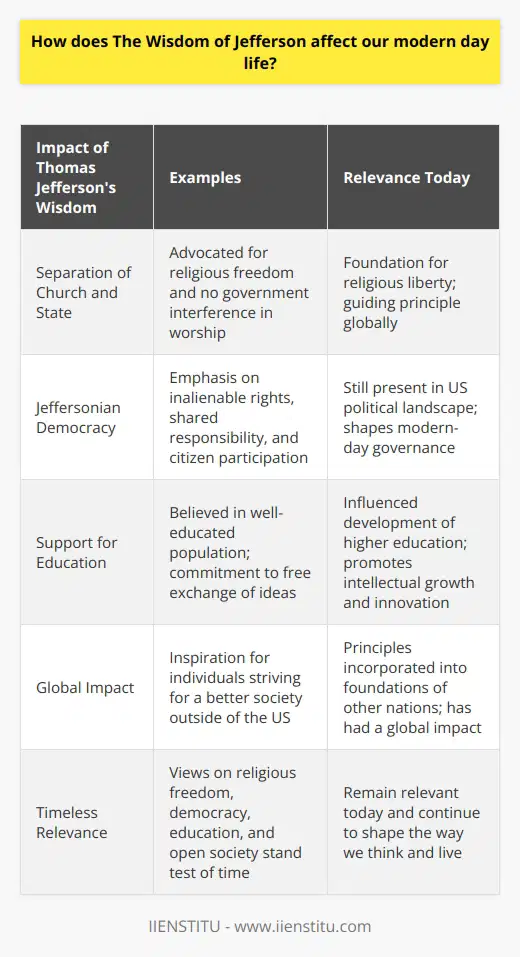
What lessons can readers take away from reading this book?
Reading a blog post can serve as an invaluable source of knowledge, providing readers with critical lessons and insights. This book teaches readers the importance of cultivating relationships, valuing experiences, and finding meaningful work.
The author begins by discussing the power of developing relationships. They emphasize how establishing meaningful connections is essential, validates the humanity of others, and can be an important tool in helping us gain unique knowledge. They explain that these kinds of relationships do not always have to be outlined and structured; they can be fluid, informal conversations and interactions which ultimately enrich the lives of individuals.
The blog post also touches upon the importance of experiences, which are often overlooked in our increasingly busy and fast-paced lives. The author notes that experiences provide the opportunity to learn, expand knowledge, and better understand the world. Through experience,s we gain an appreciation for the love, beauty, adventure, and freedom that can fill our lives, and we gain skills and knowledge that can serve us for a lifetime.
Finally, the post discusses the importance of finding meaningful work. The author talks about the power of following goals, beliefs, and ideas embedded in our life’s purpose, providing details on how to formulate a life plan that aligns with those core values. Additionally, they note how meaningful work can create a sense of fulfillment and joy, which is essential to achieving lasting success.
In conclusion, this post provides readers with critical lessons on the power of building relationships, appreciating experiences, and finding meaningful work. By exploring these topics, readers can better understand how to cultivate meaningful lives and lead fulfilling experiences.
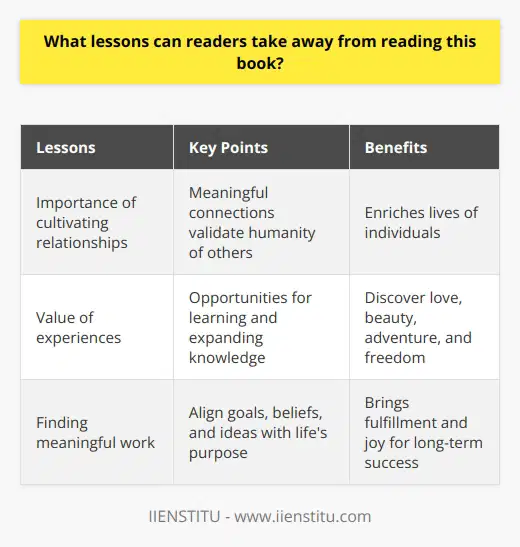
How has the tone of Thomas Jefferson's writings affected our modern world view?
Thomas Jefferson's writings have had a broadening and lasting impact on our modern worldview. His penchant for influential and eloquent piecework has been integral to American culture for centuries. Jefferson was both an innovative thinker and a masterful writer. His thoughtful and compelling persuasive language is credited with revolutionizing how political discourse and dialogue have evolved.
Due to his unique blending of intellectuality, eloquence, and creativity, Jefferson has become a respected figure in the annals of History. His writing has been a powerful tool in disseminating potent messages and ideas, many of which have shaped our modern view of the world. Jefferson's tone harnessed words and conveyed dynamic and personal messages that, to this day, still reverberate through our collective consciousness.
As a public figure, Jefferson's words profoundly affected public opinion and helped shape what remains to this day, a basis upon which laws, government regulations, and social movements heavily rely on. His use of eloquence and straightforward assessment of multiple viewpoints has, in the past and to this day, galvanized and rallied individuals to his cause. The effect of his writing on the formation of the Constitution, Bill of Rights, and Declaration of Independence, demonstrate a strong and irrefutable influence.
In today's society, Jefferson's influence on American culture can still be felt. Jefferson's writings heavily influenced many aspects of modern life, from politics and relationships to education and art. His use of dry wit and honest assessment come together to provide an intellectual perspective of matters that have, without fail, resonated with multiple generations of individuals.
Thomas Jefferson's tremendous gift and presence of the pen are still felt today. So they will be long after our modern worldview has ceased to exist. As the nation continues to evolve and progress, it is clear that Mason's pioneering letters and works will continue to shape our modern view of the world and the democracy he helped to create.
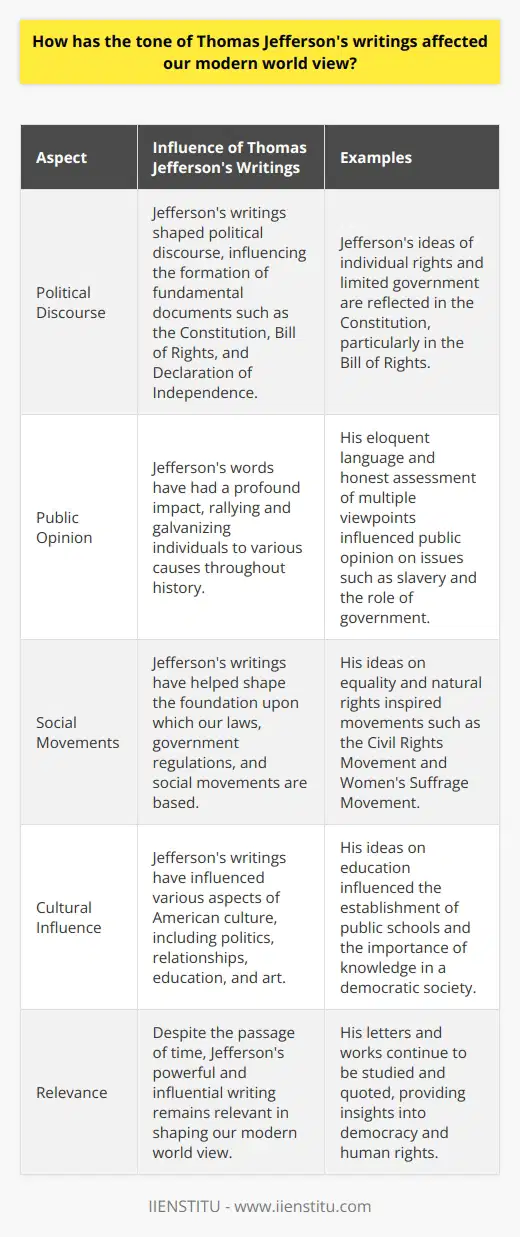
What were Jefferson's thoughts on the separation of church and state?
Jefferson's Beliefs on Religion in the Public Sphere
Thomas Jefferson, one of the founding fathers and third president of the United States, firmly believed in the necessity of maintaining a clear separation between church and state. His main objective was to ensure that the government would avoid interfering in religious matters and that religious institutions would not wield undue influence over the state.
The Virginia Statute for Religious Freedom
Perhaps the most famous example of Jefferson's commitment to this principle is the Virginia Statute for Religious Freedom, adopted in 1786. This document, penned by Jefferson, established religious liberty in Virginia by outlining that 'no man shall be compelled to frequent or support any religious worship or ministry, nor be enforced, restrained, molested, or burthened in his body or goods, nor shall otherwise suffer on account of his religious opinions or belief.' This statute laid the foundation for the First Amendment to the United States Constitution.
The Wall of Separation: the Letter to the Danbury Baptists
Jefferson's concept of a wall of separation between church and state was highlighted in his famous 1802 letter to the Danbury Baptist Association, where he wrote, 'I contemplate with sovereign reverence that act of the whole American people which declared that their legislature should make no law respecting an establishment of religion, or prohibiting the free exercise thereof, thus building a wall of separation between church and state.' This metaphorical language cemented the notion of a necessary boundary between religion and government in American political thought.
Critical Importance of Preserving Religious Freedom
Jefferson maintained that the separation of church and state was vital for preserving not only the sanctity of individual religious freedom, but also for preventing the existence of religious tyranny. He believed that allowing religious organizations to have political power could lead to the imposition of religious doctrines on segments of the population that held different beliefs. Furthermore, by ensuring that each individual could practice their chosen faith (or lack thereof) without interference, the separation of church and state would contribute to the maintenance of a peaceful and tolerant society.
In conclusion, Thomas Jefferson's thoughts on the separation of church and state were borne out of his dedication to the protection of religious liberty and the safeguarding of a democratic society. Through landmark documents such as the Virginia Statute for Religious Freedom and his influential letter to the Danbury Baptists, Jefferson's vision for maintaining a clear boundary between religious institutions and government has left an indelible mark on American history and continues to shape our understanding of religious freedom and its role in civil society.
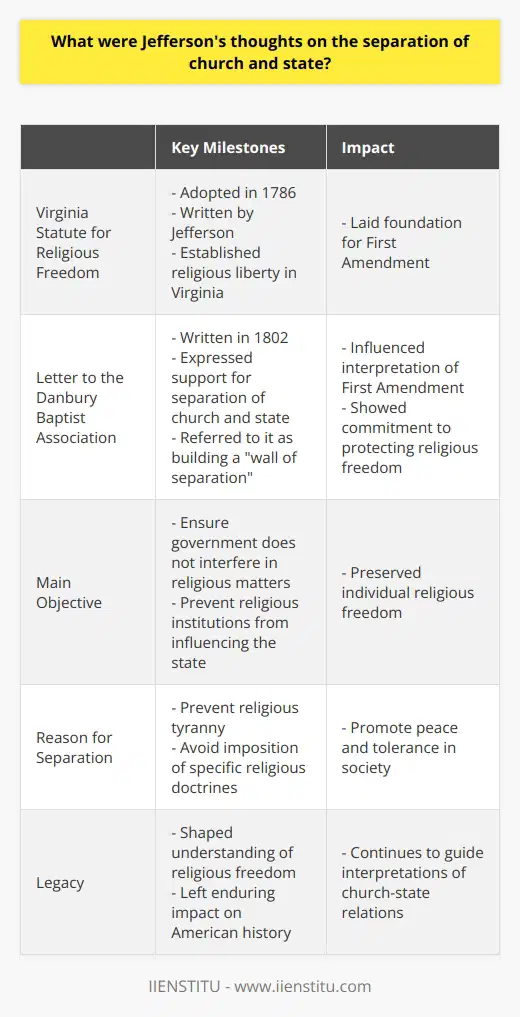
How did Thomas Jefferson's views on education influence his political philosophy?
Thomas Jefferson's Educational Ideals
Thomas Jefferson's views on education significantly influenced his political philosophy, as he firmly believed in the importance of an educated and informed citizenry as a foundational principle for a successful, democratic nation. Education was crucial to developing informed and responsible citizens, which in turn ensured the nation's stability and prosperity.
Education as a Priority for Democracy
As one of the main architects of the Declaration of Independence and the third President of the United States, Jefferson's political philosophy was grounded in the protection of individual liberties and the promotion of democratic principles. He viewed education as the cornerstone of civic responsibility, as an educated and informed population could better understand the weight of their political decisions and actively engage in the democratic process.
Educational Institutions as Agents of Change
Jefferson's beliefs in the transformative power of education led him to be a major advocate for the creation of public educational institutions. He believed that these institutions would give equal opportunities to every citizen, regardless of social and economic background. By promoting universal access to education, Jefferson hoped to create a merit-based society, in which individuals could rise through the ranks based on their talents, skills, and knowledge, rather than their birth or wealth.
The University of Virginia: A Manifestation of Jefferson's Vision
One of the most significant examples of the impact of Jefferson's educational views on his political philosophy is the University of Virginia. As the founder of the university, Jefferson personally designed the curriculum and the architectural layout of the institution. He envisioned the University of Virginia as an institution that would not only promote rigorous intellectual pursuits but also instill in its students a sense of civic responsibility, preparing them to take on leadership roles in their communities and the nation.
The Lasting Influence of Jefferson's Educational Philosophy
To this day, Jefferson's views on education continue to influence American politics, as access to education remains a focal point in policy debates. Overall, Thomas Jefferson's commitment to education as a means of fostering civic responsibility and democratic principles deeply shaped his political philosophy, emphasizing the impact knowledge has on creating a just, equitable, and prosperous society.
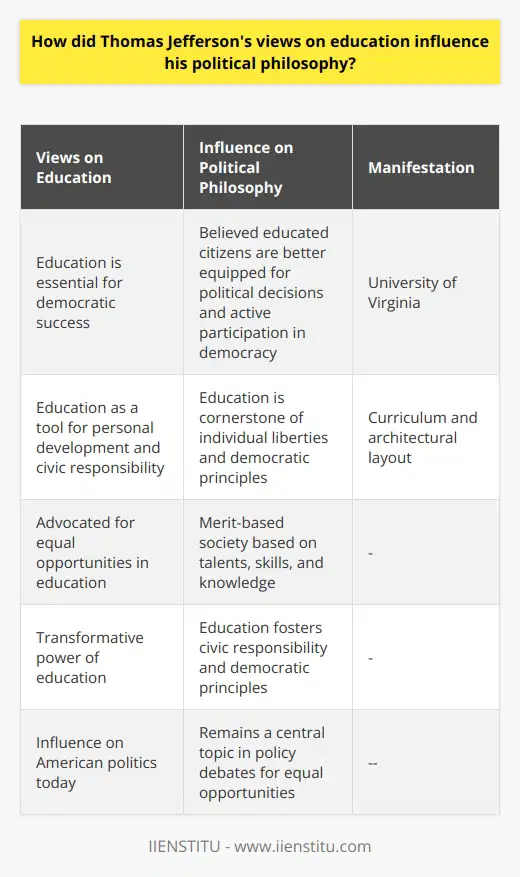
In what ways did Jefferson's ideas about agrarianism shape his approach to economics and trade policies?
Agrarianism's Influence on Jefferson's Economic Philosophy
Thomas Jefferson's staunch belief in agrarianism, the idea that a nation's strength and stability lie in its agricultural sector, largely determined his economic vision and shaped his trade policies. Jefferson saw farmers as the backbone of American society, and he believed that agriculture would bring the country sustainable prosperity, promote self-determination, and protect democratic values.
Economic Independence Through Agriculture
Jefferson rejected the Industrial Revolution's reliance on manufacturing, arguing that commerce would create an elitist society beholden to foreign interests. By prioritizing agricultural development, Jefferson aimed to foster economic independence and a self-sufficient nation that could meet its citizens' needs without relying on imports. He supported measures like the Embargo Act of 1807, which sought to limit foreign influence by restricting international trade and encouraging domestic growth instead.
Friendly Trade with Neighbors
Jefferson's economic approach to trade policies prioritized friendly relations with neighboring countries to secure essential agricultural goods without disrupting the balance of power in North America. He sought to establish a cordial alliance with Europe based on agricultural trade, which he believed would prevent dependence on foreign manufactured goods and preserve America's political autonomy.
Land and Wealth Distribution Encouragement
To promote his agrarian vision, Jefferson advocated policies that expanded land ownership and promoted equitable wealth distribution. The Louisiana Purchase in 1803 was a significant milestone, which doubled the size of the country and opened vast lands for farming. By dispersing property ownership, Jefferson encouraged a widespread investment in agriculture, thus creating opportunities for prosperity and maintaining a balanced economy.
While Thomas Jefferson's agrarianism attracted criticisms from those who saw the potential in industrialization and opposing economic policies, it nevertheless played a significant role in shaping his approach to economics and trade. He successfully laid the groundwork for an independent and self-sustaining nation that relied primarily on agricultural production through his land ownership encouragement, agricultural-centric trade, and friendly alliances.
